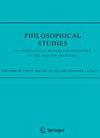没有教条主义的知识
IF 1.1
1区 哲学
0 PHILOSOPHY
引用次数: 0
摘要
蕾切尔-弗雷泽、吉尔伯特-哈曼、索尔-克里普克和玛丽亚-拉索嫩-阿尼奥提出了知识的悖论意义论证。这些论证认为,知道一个命题就可以教条地相信它,或教条地保持对它的信心,或教条地打算继续相信它。然而,"知道 "是否能证明任何教条主义都是合理的,这一点很值得怀疑。我们将对这些论点进行评估。我们将看到为什么知识不能成为教条主义的理由。原因主要在于,遵从我们的证据从来都不是教条主义,知识从来都不会推翻或削弱从我们的证据中得出的正当性。本文章由计算机程序翻译,如有差异,请以英文原文为准。
Knowledge without dogmatism
Rachel Fraser, Gilbert Harman, Saul Kripke, and Maria Lasonen-Aarnio have offered arguments for paradoxical implications of knowledge. The arguments contend that knowing a proposition justifies believing it dogmatically, or dogmatically maintaining confidence in it, or dogmatically intending to continue to believe it. Yet it is quite doubtful that knowing could justify any sort of dogmatism. The arguments will be assessed. We will see why knowledge does not justify being dogmatic. The reason is essentially that deferring to our evidence is never dogmatic, and knowledge never overrides or undercuts the justification that derives from our evidence.
求助全文
通过发布文献求助,成功后即可免费获取论文全文。
去求助
来源期刊

PHILOSOPHICAL STUDIES
PHILOSOPHY-
CiteScore
2.60
自引率
7.70%
发文量
127
期刊介绍:
Philosophical Studies was founded in 1950 by Herbert Feigl and Wilfrid Sellars to provide a periodical dedicated to work in analytic philosophy. The journal remains devoted to the publication of papers in exclusively analytic philosophy. Papers applying formal techniques to philosophical problems are welcome. The principal aim is to publish articles that are models of clarity and precision in dealing with significant philosophical issues. It is intended that readers of the journal will be kept abreast of the central issues and problems of contemporary analytic philosophy.
Double-blind review procedure
The journal follows a double-blind reviewing procedure. Authors are therefore requested to place their name and affiliation on a separate page. Self-identifying citations and references in the article text should either be avoided or left blank when manuscripts are first submitted. Authors are responsible for reinserting self-identifying citations and references when manuscripts are prepared for final submission.
 求助内容:
求助内容: 应助结果提醒方式:
应助结果提醒方式:


